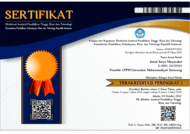Pelatihan Kecerdasan Artifisial (KA) kepada Guru SD di Kabupaten Blora Jawa Tengah untuk Peningkatan Kemampuan di Bidang Digital
(1) UNIVERSITAS MUHAMMADIYAH SEMARANG
(2) Universitas Muhammadiyah Semarang
(3) Universitas Muhammadiyah Semarang
(*) Corresponding Author
Abstract
In this era of digitalization, the Government is trying from an early age to introduce programming concepts and Artificial Intelligence, which in the future can be used to support the learning process of elementary school education. This training aims to provide new knowledge about how coding programs are included in the subject matter of elementary school children. The teachers are given lessons on basic things suitable to be applied in class and immediately put into practice their projects. With this method, teachers learn to adapt to the new model, where the material will be taught to students in class. Activities are carried out offline at the Arra Cepu Hotel. Stages of Training through Presentations, Videos, and Quizzes. In this activity, the teachers gain knowledge and skills in coding programs for beginners; pre-test and post-test will be used as a measure to assess it. In the future, teachers will experiment with coding lessons with students. An early introduction to programming and artificial intelligence for elementary school teachers is expected to positively impact students, mainly in their ease of receiving and understanding a lesson.
Keywords
Full Text:
PDFReferences
Carney, M., Webster, B., Alvarado, I., Phillips, K., Howell, N., Griffith, J., Jongejan, J., Pitaru, A., & Chen, A. (2020). Teachable machine: Approachable web-based tool for exploring machine learning classification. Conference on Human Factors in Computing Systems - Proceedings. https://doi.org/10.1145/3334480.3382839
Chen, L., Chen, P., & Lin, Z. (2020). Artificial Intelligence in Education: A Review. IEEE Access, 8, 75264–75278. https://doi.org/10.1109/ACCESS.2020.2988510
Ivannikov, A., & Stempkovskiy, A. (2021). The Basics of Digital System Designs Simulation for Hardware/Software Joint Debugging. International Seminar on Electron Devices Design and Production, SED 2021 - Proceedings. https://doi.org/10.1109/SED51197.2021.9444523
Sanger, P. A., & Ziyatdinova, J. (2014). Project based learning: Real world experiential projects creating the 21st century engineer. Proceedings of 2014 International Conference on Interactive Collaborative Learning, ICL 2014, 541–544. https://doi.org/10.1109/ICL.2014.7017830
Schmeck, R. R., Geisler-Brenstein, E., & Cercy, S. P. (1991). Self-Concept and Learning: The revised inventory of learning processes. Educational Psychology, 11(3–4), 343–362. https://doi.org/10.1080/0144341910110310
Yildiz Durak, H., Saritepeci, M., & Durak, A. (2021). Modeling of Relationship of Personal and Affective Variables With Computational Thinking and Programming. Technology, Knowledge and Learning. https://doi.org/10.1007/s10758-021-09565-8
Article Metrics
Abstract view : 306 timesPDF - 86 times
DOI: https://doi.org/10.26714/jsm.5.1.2022.101-105
Refbacks
- There are currently no refbacks.
Copyright (c) 2022 Jurnal Surya Masyarakat

Jurnal Surya Masyarakat (JSM) is licensed under Creative Commons Attribution-NonCommercial-NoDerivatives 4.0
------------------------------------------------------------------------------------------------------------------------
Jurnal Surya Masyarakat (JSM)
p-ISSN: 2623-0364; e-ISSN: 2623-0569
Published by: Lembaga Penelitian dan Pengabdian Masyarakat (LPPM) Universitas Muhammadiyah Semarang



.jpg)







.jpg)